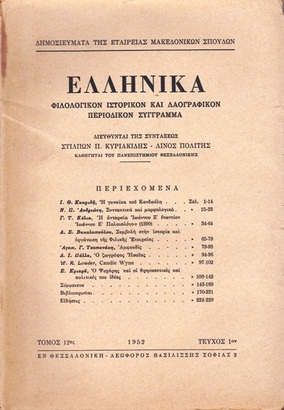Οκτάνα, Σινώπη, Αμοργός : Τρεις αόρατοι τόποι «όπου το ρήμα κρουσταλλώθηκε και φέγγει»
Part of : Ελληνικά : φιλολογικό, ιστορικό και λαογραφικό περιοδικό σύγγραμμα ; Vol.44, No.2, 1994, pages 399-422
Issue:
Pages:
399-422
Parallel Title:
Oktana, Sinope, Amorgos : Three Invisible Places, Where the Word Shines.
Author:
Abstract:
In contrast to the French, Greek Surrealist poetry often foregrounds its topography by naming various places of the reality which it creates or recreates. This paper focuses on three texts: Embirikos' Όχι Μπραζίλια μα Οκτάνα, Engonopoulos' Η ζωή και ο θάνατος των ποιητών, and Gatsos' Αμοργός, and examines them from the point of the relationship between topos (place) and logos (poetic diction). Oktana is gradually built up in the poetry of Embirikos by logos, which gradually reveals its own omnipotence. From this point of view, the inter-textual building of Oktana can be seen as an initiation process: that of the poet into logos. While for Embirikos poetry creates a new city for the world, Engonopoulos' Sinope is a city where only poets live and die. Poetry aspires at communication, but at the same time stresses its dangers, and the poet is initiated into the inevitability of a wonderful but mortal logos. In Gatsos' Αμοργός, logos guides its bearer through experiences of love and death, destruction and rebirth, and finally leads him to a new, liberated, topos. The price for the initiation of the poet and the liberation of the topos is the poet's solitude. By focusing on the power of logos, all three texts introduce a new aspect into the tradition of poetry as initiation or revelation: while in other, non-Surrealist, poems (e.g. Palamas' Ασχραίος, Seferis' Έγχωμη, Sikelianos' Ιερά Οδός) topos activates logos, here the process is the reverse. The three topoi are created by logos and constitute signs of the poet's initiation into logos itself.
Subject:
Subject (LC):




